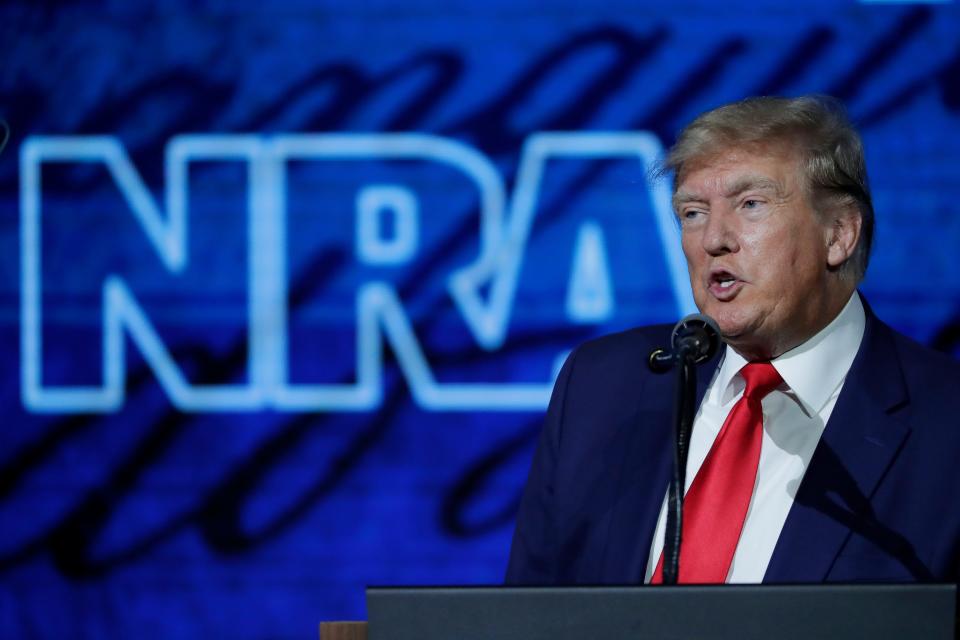Supreme Court dismisses lawsuit over Trump's 'public charge' immigration rule
- Oops!Something went wrong.Please try again later.
- Oops!Something went wrong.Please try again later.
- Oops!Something went wrong.Please try again later.
WASHINGTON – The Supreme Court on Wednesday dismissed a lawsuit filed by Arizona and a dozen other conservative states that wanted to join a federal lawsuit in order to challenge the way President Joe Biden ended a Trump-era policy intended to curb legal immigration.
After hearing oral arguments in the case in February, the court issued a one-sentence unsigned decision noting the case is dismissed. Though the high court didn't address the substance of former President Donald Trump's "public charge" rule, the dismissal represented a win for the Biden administration.
The "public charge" rule, issued in 2019, denied green cards to immigrants if officials determined they might benefit from safety net programs, such as rental assistance or food stamps. The Biden administration decided last year it would no longer defend lawsuits that attempted to block the rule's implementation.
The substantive policy wasn't at issue in the case: The question for the high court was whether the Biden administration circumvented the usual requirements necessary to roll back another administration's policy. But in a concurring opinion, Chief Justice John Roberts said that question was wrapped up with too many other questions.
"That resolution should not be taken as reflective of a view on any of the foregoing issues, or on the appropriate resolution of other litigation, pending or future, related to the 2019 Public Charge Rule, its repeal, or its replacement by a new rule," Roberts wrote.
Associate Justices Clarence Thomas, Samuel Alito and Neil Gorsuch joined Roberts.
The decision left in place a lower court ruling that Arizona could not intervene.
It's one of at least three cases at the Supreme Court this term in which conservative states or lawmakers are seeking to step in to defend Republican-approved laws in federal court. In one, Kentucky's Republican attorney general sought and won a decision from the high court allowing him to defend a state ban on an abortion procedure.
In another case, Republican state lawmakers are seeking to intervene in a challenge to a contentious 2018 election law that would require voters in North Carolina to show photo identification at the polls. That case has not yet been decided.

Federal agencies are generally required by law to conduct thorough reviews and seek public comment to end a policy or set aside a regulation from a previous administration. In this case, the Biden administration chose not to appeal a court order blocking the rule. That had the effect of allowing Biden to kill the Trump-era immigration rule without going through the usual process.
In his concurring opinion, Roberts questioned whether the Biden administration's handling of the matter comported "with the principles of administrative law." But bound up in that question, he continued, "are a great many issues," what he described as a "mare’s nest" that "could stand in the way of our reaching the question presented."
Though focused on procedural questions, the decision could have had consequences for future presidents as gridlock has made it far harder for either party to advance legislation through Congress. Presidents often attempt to accomplish their priorities through regulations or executive orders when their party loses control of Congress, though those unilateral efforts are often challenged in court.
Those questions must now be resolved in another case.
Brittni Thomason, a spokesperson for Arizona Attorney General Mark Brnovich, said in a statement that the coalition of states is evaluating how to continue the fight.
"We appreciate the four justices who recognized that today’s dismissal should not affect other litigation related to the 2019 public charge rule, its repeal, or replacement by a new rule," Thomason said.
The public charge rule is one of the last major immigration issues pending from Trump, who ran for president in 2016 largely on a promise to impose stricter rules for legal and illegal immigration. Biden has unwound many but not all of those policies over the past year. In another case, pending at the Supreme Court, the justices will decide whether the Biden administration properly shut down a Trump policy requiring migrants seeking asylum to remain in Mexico while their claims are processed.
This article originally appeared on USA TODAY: Supreme Court dismisses case over Trump-era 'public charge' rule

